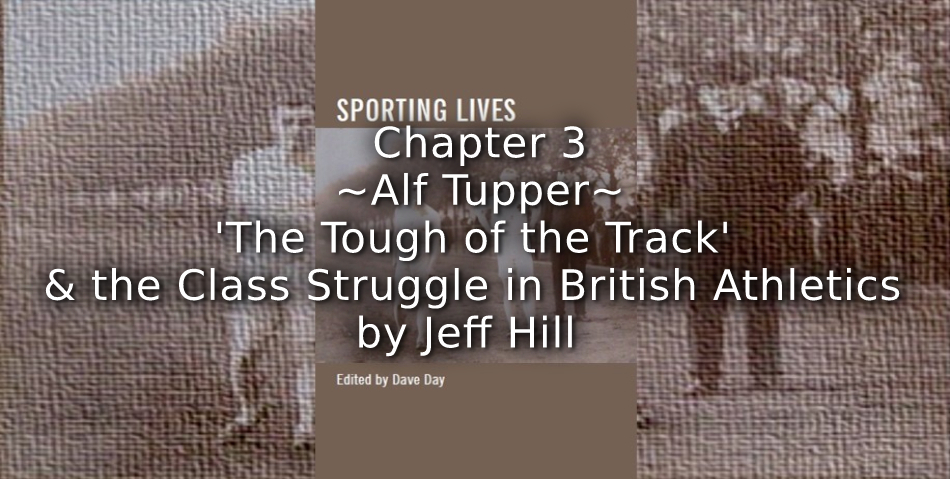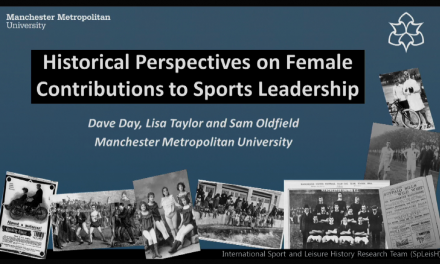Playing Past is delighted to be publishing on Open Access – Sporting Lives, [ISBN 978-1-905476-62-6] a collection of papers on the lives of men and women connected with the sporting world. This edited volume has its origins in a Sporting Lives symposium hosted by Manchester Metropolitan University’s Institute for Performance Research in December 2010.
Please cite this article as:
Hill, J. Alf Tupper – ‘The Tough of the Track and the Class Struggle in British Athletics, In Day, D. (ed), Sporting Lives (Manchester: MMU Sport and Leisure History, 2010), 30-39.
3
______________________________________________________________
Alf Tupper – ‘The Tough of the Track’ and the Class Struggle in British Athletics
Jeffrey Hill
______________________________________________________________
In 2008 the Independent on Sunday ran a feature on a leading British middle-distance runner of the late 1940s and early 1950s.[1] He was Bill Nankeville, a milkman’s son from Woking who ran in the final of the 1500 metres at the 1948 Olympics. Between 1948 and 1952 Nankeville won the Amateur Athletics Association (AAA) mile title on four occasions. Asked by the newspaper about the social relations in athletics in his day, Nankeville said: yes, there was class distinction, but you didn’t seem to worry much about it. ‘It was just wonderful to be able to represent your country, especially for someone like me, coming from where I did.’[2] Nankeville was aware of a class divide in athletics, but like many sportsmen of his generation, in games such as cricket and rugby as well as in athletics, he was prepared to accept the established order of things rather than kick against it.
Not so another leading runner of the day, Alf Tupper – the Tough of the Track – the comic-book hero whose popularity reached its peak in the 1950s and 1960s. Tupper was the creation of the writer Gilbert Dalton, and made his first appearance in the D.C. Thompson publication Rover in 1949. In 1961 he was given comic-strip form and moved to another Thomson title, Victor. Here he ran for some thirty years, though as the world of athletics changed his appearances became less and less frequent. As a working man and a committed amateur Tupper was something of an anachronism in an age when top athletes had become highly-paid professionals. In 1992 Alf was quietly retired.[3]
Tupper was presented to his readers – mainly working-class secondary schoolboys – as a truculent individualist with a supreme talent for running: middle-distance, of course, since the stories came onto the market at the same time as Britain’s greatest achievements in this event. Tupper was the fictional equal not only of runners like Nankeville but of the yet more celebrated athletics stars of the period – people like Bannister, Chataway, Pirie and Ibbotson. Unlike any of them Alf actually won an Olympic gold, in Helsinki in 1952. His demeanour both on and off the track, however, compared with ‘rebel’ athletes like Gordon Pirie rather than university-educated runners such as Bannister and Chataway.[4] More than middle distance separated Alf from them, who were worlds apart from him socially. But it was Alf’s humble origins and his championing of ordinary men and women that kept the relationship with his readers alive. Alf was ‘real’; more so, for example, than his fictional comic-book contemporary Wilson, who appeared in Wizard. Wilson’s astonishing athletics achievements had a magical quality about them. Tupper’s triumphs on the other hand seemed achievable, at least for someone with outstanding abilities. Wilson’s were more than extraordinary, they were unbelievable. He lived in a cave on the moors and had subsisted for over a hundred years on a diet of berries.[5] Alf’s food was fish and chips and his environment was unambiguously urban. Realistic too were the places Alf inhabited: the towns of Brassingford and Greystone, down-to-earth Midlands industrial towns with important engineering factories, part of the beating heart of the British post-war economy. The stories even contained an element of ‘technical’ detail about workshops, work routines, and machinery, all of which, we might suppose, would strike a chord in the minds of the many readers anticipating an engineering apprenticeship on leaving school.
The stories, told in a third-person voice, were at one level simply exciting sport dramas written to a predictable formula. Alf was an outstanding runner and a particularly fierce competitor. ‘I’ll run him’ was his trademark challenge to any rival who sought to better him. A race with Alf promised a draining physical and mental contest calling upon all the resources of the human body. Alf was able to draw upon a deep resilience – ‘’I just don’t like being beat’ he would say when asked to explain the secret of his success[6] – and in many races when apparently losing he summoned up a reserve of energy to pip his rivals to the tape. Each story would climax in a thrilling race, but interspersed with the athletics theme would be a challenge of some kind that needed to be met before the race itself began. It was usually work-related and always involved strenuous physical exertion on Alf’s part. The effort of achieving a solution either explained Alf’s failure to win (though he himself never sought excuses) or made his ultimate victory the more remarkable for its having been won in unfavourable circumstances. A frequent test came in the form of the ‘rush job’. Alf, a welder by trade, would be faced with a critical order demanding two or three days of unremitting toil, forcing him frequently to work throughout the night. The job would be completed by about midday on the Saturday of an important athletics event, with Alf delivering the finished work (usually in a handcart in the early stories, thus adding to his physical burden) before catching a bus or hitching a lift to the track. Often, as he made his way to the stadium, he would see his rivals cruising past him in a luxury motor coach – a symbol of contrasting life experiences. Here is encountered the central moral theme of the stories. Nothing came easily for Alf; everything had to be struggled for through hard, disciplined work. The contrast between ‘haves’ and ‘have nots’ was a constant feature in the life of Alf Tupper.
Tupper’s athletic determination carried through into his social relationships, giving the character a political quality not usually present in juvenile fiction. It is manifested in Alf’s aggressive quest for fairness and justice for people like himself who have nothing, and is directed in the main against supercilious members of the upper class. Although the publishers, D.C. Thomson, were a politically conservative firm the figure of Alf has obvious links with the ethos of ‘fair shares for all’ that had been formulated during the war and enshrined in the Labour Party’s 1945 election manifesto Let Us Face the Future.[7] In the Tupper stories it is brought out in relation to both work and sport. Work and workplace relations form an important part in the stories. Alf’s welding skills are instilled not by book learning but – as in the tradition of the millwrights of old – by diligent observation of the ‘mysteries of the trade’. He has an almost intuitive understanding of machinery. Allied to this is a prodigious capacity for hard work. At one aircraft factory, he is taken on after impressing the works manager with his steely determination to see the task through. ‘Offer him a job’, says the manager to his foreman:
That’s the kind of worker we want, the kind of fellow who can work all night and all day in order to get a rush job done, then turn out in a mile race, win it, pass clean out, and, on being taken home, start at once to his work. What a lad![8]
In this respect Alf might seem a model employee. But, at the same time, he retains many of the traditional attributes of the skilled worker: pride in his status, a defiant guarding of his skills, control over the carrying out of his work, and a complete lack of reverence for authority. Men of whatever position are invariably addressed as ‘mister’, shown no deference, and judged by their competences not by their background or social position. Alf’s ‘toughness’ is a mark of his sense of individualism and independence.
His chosen sport has a particular significance. While there were many British clubs with a relatively humble membership and location athletics was, as Bill Nankeville’s reminiscences suggest, a sport controlled by a social elite.[9] The ruling body, the AAA, was Oxbridge- dominated and had conducted a long (and largely successful) struggle to turn the sport away from the taint of gambling and money-making with which it had been associated in the Victorian period. Athletics was therefore keenly amateur in spirit, and equally hostile to any suggestion of professionalism. All athletes, of whatever social class, were amateur, and none more so than Tupper. He rejected offers to run for money, and while he loved his sport he always gave priority to his job: ‘[r]unning’s my sport, mister, but welding is my work, and work comes first’.[10] Upper-class amateurs – the ‘toffs’ as Tupper called them – were freer to devote time to athletics, and it was such people who were to be found in the leading positions of the sport. It was this presence and the influence it wielded that Alf Tupper fought. In his running there was always a streak of class conflict: ‘I like to have a go at the swanks’, he says, as if his mission is to prove that given the opportunity working men can achieve as much as those from a more privileged background.[11] Many of his opponents, though excellent athletes, are snooty: the Hon. Piers Mornington, for example, a Cambridge sprinter known as ‘the light blue streak’; Jerrard Tarne, a hurdler who trains in the United States; and the haughty Lew Murdoch, who travels from meeting to meeting in a customised motor caravan provided by his rich father and driven by Lew’s own personal masseur. Nor is snobbery and privilege is confined to British athletes. Overseas adversaries are equally as likely to offend Alf’s sense of common decency. Skimba Ru, for example, the son of a Zulu chief, and the American Lash Lanigan, represent ‘toffee-nosed types’ from abroad. It is remarkable how often the ‘toffs’ encountered in the Tupper stories are also ‘swanks’ and ‘snobs’. Moreover, in spite of the ethos of fair play they will resort to cheating if they cannot prevail by acceptable means. All come from families able to support their athletics without the need for them to do a ‘proper’ job. Thus, while amateurs in name, they are in effect full-time runners who embrace the professionalism denounced by the governing body – ‘shamateurs’ as the press was beginning to call them in the 1950s. The fictional world of athletics is riddled with such hypocrisy and unfairness. The sport seems to exist for the benefit of the rich. Readers are left in little doubt that these representatives of the British establishment occupy their position at the expense of those who, either lacking the financial means or the exceptional ability possessed by Tupper, suffer from missed opportunities, their potential talent and contribution to sport thereby unfulfilled. Thus within the text of the stories lies a discourse of modernisation that questions the status quo.
As a symbol of a popular animus against the well-to-do, Alf was also in many ways a loner with a personal autonomy comparable to many contemporary heroes of crime fiction and the western. He is poor, and on occasions verges on poverty. In one of the last series, which appeared in 1990, Alf declares: ‘times are hard and work is scarce. Gotta hunt up a few jobs or I don’t eat next week.’[12] Notwithstanding his skills, Tupper operates on the margins of the labour market, oscillating between states of waged- and self-employment and rarely staying in the same job for very long. He has few possessions, and what he owns has usually been purchased second hand. He has no home; often he lives where he works, sleeping on the floor and washing at the works tap. In a series of 1952, when Alf is working on the railways in a locomotive depot, he inhabits a disused platelayers’ hut at the side of the track. In none of the stories does Alf have a car, nor even aspire to owning one. His meals consist of fish and chips, his love of which constitutes his only known pleasure, aside from the pleasure of running. His ‘best’ clothes are an old sports jacket and trousers, but his usual attire is a pair of workman’s overalls. His running kit is moth-eaten, and his vest mysteriously carries the monogram ‘MHC’, which (readers are eventually informed) stands for ‘Moontucket Hunting Club’: it is a cast-off, discarded by some wealthy American, and picked up by Alf for half a crown (12.5 p.) at a jumble sale. At the start of a crucial mile race the narrator wryly observes: ‘All stripped off tracksuits except Alf, who didn’t have one.’[13] Tupper has no family, and rarely operates within a strongly established social network. As an athlete he is not a club man, preferring on most occasions to enter races as an ‘unattached’ competitor. As a workman his pride ensures that Alf stands up for his rights, but there is little of the class solidarity we might otherwise associate with the skilled worker’s outlook, historically expressed in independent trades unionism and the labour movement. No matter where readers might place him on the political spectrum, Alf’s own preferences are unspoken. He follows a lone path, solving problems by individual effort.
Work and running, however, represent twin aspects of a certain kind of masculinity, always a central motif of the boys’ comic hero. The American critic Michael Oriard, in creating a typology of fictional sport heroism from American literature, has noted that: ‘the athlete-hero is primarily a ‘prowess hero” … He is always handsome, generally medium in size, and in all ways manly.’[14] As a model of masculinity in the 1950s Tupper exhibits conventional qualities of strength, determination and honesty but in other respects is something of an oddity. In a period often described as ‘the age of affluence’ he actually contradicts much of the reader’s contemporary social knowledge, experience and aspirations – undermining the ‘common sense’ about growing up. You have to read against the grain to believe in him. There is no indication of contemporary consumer behaviour in Tupper’s material circumstances. Nor is appearance important to him. His hair is a mess, and it is frequently remarked in the early stories that he does not wear socks, because they ‘make his feet sweat.’[15]
There is too a great silence in the stories. If, as Richard Hoggart has claimed, sex and sport were the two major topics of interest in the mid-twentieth century male workplace,[16] the Tupper stories give the reader plenty of the latter but of the former there is no sign. In his work on Tupper Brendan Gallagher has pointed out that ‘sex and emotional turmoil were not to be acknowledged or spoken about’[17]. Gallagher attributes this to the times, when young men who had come through the war were expected to be stoical and not tangle with ‘feelings’. There is a suggestion in this that masculinity – and especially perhaps working-class masculinity – involved an unknowingness about intimate relationships, a theme taken up and explored with great sensitivity in David Storey’s fine novel of northern working-class gender relations This Sporting Life.[18] For Alf, women scarcely featured in his life. His mother had died when he was young, and thereafter the opposite sex was represented either by vile harridans like his appallingly alcoholic and devious Aunt Meg, or grumpy landladies. When we consider that readers of the stories would have been experimenting in one form another with sex – ‘exploring their sexuality’ to use a modern phrase – and that even that other great fictional schoolboy hero Biggles was known to have had one or two dalliances (chaste, to be sure) the omissions seem surprising.[19] But they were not confined to Tupper. In all the D.C. Thomson comics the emphasis was on male society and camaraderie: war and sport provided the dominant subjects of the story lines, and although school stories were rare there was a residual trace of fictionalised school culture. While Tupper was in many respects far removed as a character from the public-school figures in the Gem and the Magnet, especially the egregious Bunter, there is a similar monosexual – should we say even misogynist? – tone about both sets of stories. At a time when youth (and especially male youth) was creating for itself a cultural space through distinctive styles – even the 1960s skinheads fashioned out of their apparent anti-style a stark persona of stripped down menace – Alf Tupper remained the antithesis of contemporary models: completely resistant to fashion, music, cars, sex and all the other temptations which Mark Abrams in his classic 1959 study of youth culture observed as being the badge of the teenage consumer.[20] And when such behaviour gave rise to notions of ‘embourgeoisement’ and the decline of social class Tupper stood as an unregenerate representative of an older and more austere working-class lifestyle.[21]
Conclusion
Gilbert Dalton had created Tupper in the aftermath of the 1948 London Olympics, where British athletes had met with little success. His aim was to inspire the younger generation to take up athletics. It is, of course impossible to measure the impact the stories might have had in this respect, though D.C. Thomson was selling close on half a million copies when Victor was launched in 1961, which meant that Tupper was reaching a nationwide audience.[22] Running was presented as a sport that anyone with determination could take up. No special resources were needed apart from time, which was available before and after school and work. Clubs were there if people wished to join them, though Alf usually didn’t. They were where the chief obstacle to working people’s enjoyment of athletics was likely to be found – in the form of snobbery. Alf’s success on the track was explained by individual talent and resolve. He had received no coaching; in fact he remained averse to anything that smacked of ‘schooling’. Nobody told Alf how to run or train. As with work, his sporting knowledge and technique were intuitive. Several stories make fun of scientific training regimes, especially where diet is concerned. Fish and chips provide the necessary fuel to run fast. In the end the approach was simple. As Alf always said when asked about his method: ‘I ain’t got one – I just run as fast as my legs will carry me.’[23]
What about the political undertones of the stories? How might contemporary readers have responded to them? Before answering, we must first of all be clear that Tupper is not an unambiguous symbol of anything. The character of Alf is a contradictory and elusive one that defies simple pigeon-holing.[24] For one thing the Tupper stories bear some similarities with that older form of schoolboy tale to be found in the Gem and the Magnet. George Orwell, in a famous essay written at the outbreak of the Second World War, found these weeklies to be fixated with public-school mores embodied in ‘good’ boys who upheld ideas of fair play. Ideologically they purveyed a nostalgia for an England of the pre-First World War, and were (as Orwell put it) ‘sodden in the worst illusions of 1910’. He was especially struck by the prevailing tone of somnolent conservatism, and this led Orwell to conclude that the comics were a ploy by the owners of the large press organisations to focus boys’ reading on the kinds of values and priorities that served the interests of the ‘ruling class’.[25]
The Tupper stories certainly do not serve this purpose, though at the same time do not entirely reject other aspects of their fictional legacy. For example, without being overtly jingoistic they nonetheless indulge in an Anglo-centrism that creates conventional stereotypes of Americans (ostentatious and boastful), east Europeans (unimaginative and bureaucratic), and Arabs (lazy and deceitful). There is also a similar moral earnestness, brought out through the same kinds of fictional devices used in older weeklies, where the good/decent is counterpoised to the obviously shady. Stock characters invite the reader to form easy associations and identifications from predictable, formulaic situations. Lew Murdoch and the other snobs in the Tupper stories perform a role similar to that of Billy Bunter in the Magnet, bringing forth from Tupper a basic decency and rough-hewn morality that readers might share.
By contrast, however, the Tupper stories assume a critical stance towards the contemporary social order. They can, I would suggest, be read as subversive of dominant British discourses of the period, even the one to which the stories partly subscribe and which argued for a process of ‘modernisation’ to forge a new, post-imperial form of capitalism.[26] Tupper diverged from this in three ways: by rejecting consumerism, by providing a statement of class at a time when the relevance of this social identity was being questioned, and thirdly by creating an oppositional ethic that sat uneasily with contemporary notions of social and political consensus. This is symbolised in the races that form the narrative climax of the stories. Because of circumstances that placed him at a disadvantage Tupper needed to draw upon deep reserves of energy and determination if he was to succeed. We are asked to believe that Alf’s victories were forged in adversity and motivated by a desire to triumph over injustice. Jason Cowley has reminded us that this was a key function of the comic book text: ‘you didn’t read the Victor for a realistic representation of contemporary society; you read it to be inspired […]’.[27] There are two ways of looking at this. In one sense the fictional race might be equated with the race of life, and the moral lesson conveyed in the stories might therefore be the simple one of sticking to your task and seeing it through by playing fair. In this reading Tupper’s race represents a personal challenge which, when approached with determination, allows for an individual solution. But this is a reading in which the broader and bigger issues of society – those outside the scope of individual influence and requiring collective action – are obscured. The stories might therefore seem to be saying put up with the system, make the best of it, and console yourself with specific individual honours. There is, however, an alternative reading related to the material and social conditions of the text’s production. D.C. Thomson’s commercial imperative of selling realist fictions to working-class readers dictated that a particular layer of class sensibility should be present in the stories. Part of the popularity of Alf as a character was that he seemed ‘real’ to readers: he captured, to an extent, their own experiences and mentalities. In this sense there is a powerful suggestion in Tupper that the system is not perfect, or even the best available; it is unequal and often unfair, and this demands that the individual be prepared at times to kick against the pricks. This is not a revolutionary ethos, but it does proclaim a spirit of stubborn independence.
References
[1] Independent on Sunday, February 17 2008, 76-7.
[2] Ibid., 76.
[3] On Tupper see: Jeffrey Hill, ‘”I’ll Run Him”: Alf Tupper, Social Class, and British Amateurism’, Sport in History 26, 3 (December 2006): 502-19; ‘Alf Tupper: Real Worlds and Imagined Heroes’ in Stephen Wagg and Dave Russell, Sporting Heroes of the North: Sport, Region and Culture (Newcastle: Northumbria Press, 2010), 71-86; ‘”I Like to Have a Go At the Swanks”: Alf Tupper and English Society 1945-90’, in Philip Dine and Sean Crosson, Sport, Representation and Evolving Identities in Europe (Bern: Peter Lang, 2010), 79-100; Brendan Gallagher, Sporting Supermen: The True Stories of Our Childhood Comic Heroes (London: Auram Press, 2006), 47-75.
[4] Pirie’s ‘rebelliousness’ was expressed in his appropriately titled autobiography Running Wild (London: W.H. Allen, 1961).
[5] On Wilson see Gallagher, Sporting Supermen, 17-43.
[6] Victor, March 9, 1968, 22.
[7] Hill, ‘”I Like to Have a Go at the Swanks”’, 83-5.
[8] Rover, April 22, 1950, 69.
[9] Ross McKibbin, Classes and Culture: England 1918-1951 (Oxford: Oxford University Press, 1998), 358.
[10] Rover, April 24, 1954, 70.
[11] Rover, April 29, 1950, 66.
[12] Victor, April 12, 1990, 3.
[13] Rover, April 24, 1954, 56.
[14] Michael Oriard, Dreaming of Heroes: American Sports Fiction 1869-1960 (Chicago: Nelson Hall, 1982), 30.
[15] Rover, June 14, 1952, 42.
[16] Richard Hoggart, The Uses of Literacy: Aspects of Working-Class Life, with special reference to publications and entertainments (London: Chatto and Windus, 1957), 91.
[17] Gallagher, Sporting Superman, 50.
[18] David Story, This Sporting Life (London: Longmans, 1960).
[19] See ‘Affaire de Coeur’ in W.E. Johns, The Camels Are Coming (London: John Hamilton, 1932), 227-43.
[20] Mark Abrams, The Teenage Consumer (London: London Press Exchange, 1959).
[21] Many of the new ideas about ‘embourgeoisement’ and the ‘end of ideology’ appeared in the discipline of sociology in the 1950s and early 1960s. For a contemporary critical appraisal see J.H. Westergaard, ‘The Withering Away of Class: A Contemporary Myth’, in P. Anderson and R. Blackburn, Towards Socialism (London: Fontana, 1965), 77-113.
[22] By the mid 1950s Rover’s circulation was over 250,000, but had dropped to 52,000 by the time of the final issue in 1973. When Tupper moved to Victor at its lunch in 1961 the comic’s circulation was just short of half a million. In 1970 it was 384,00, and 135,000 ten years later. (I am grateful to Mr Bill McLoughlin of D.C. Thomson for supplying me with this information.)
[23] Rover, June 8, 1957.
[24] See Hill, ‘I Like to Have a Go At the Swanks …’ in Dine and Crosson, Sport, Representation and Evolving Identities, 91-4.
[25] George Orwell, ‘Boys’ Weeklies’ in George Orwell, The Penguin Essays of George Orwell (Harmondsworth: Penguin, 1984), 106.
[26] See Kenneth O. Morgan, The People’s Peace: British History 1945-1990 (Oxford: Oxford University Press, 1992), 199-203.
[27] Jason Cowley, ‘We Can Be Heroes’, New Statesman, August 23, 2004.





